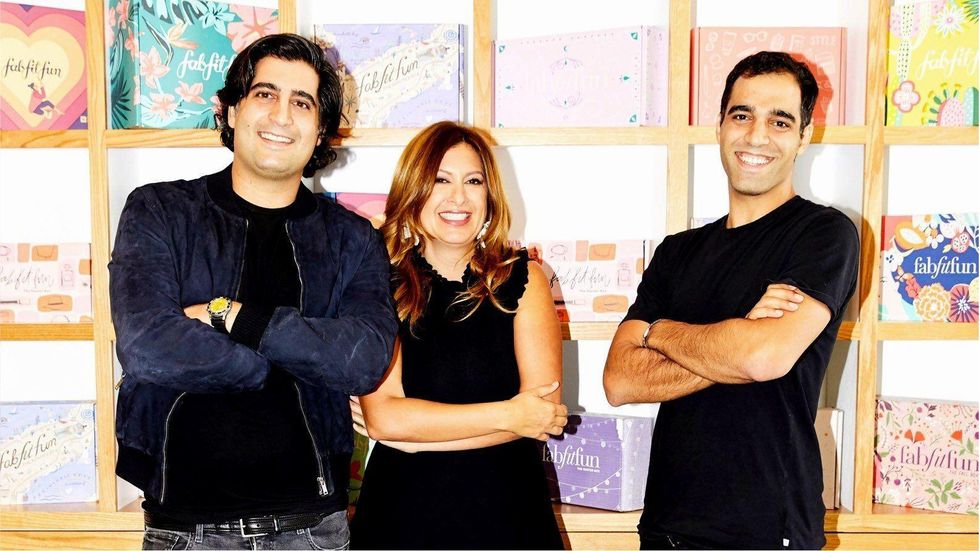FabFitFun Now Lets Subscribers Pick Everything In Their Member Boxes
JP Mangalindan is a senior contributing writer to dot.LA. His work has appeared in numerous publications over the last 18 years, including Bloomberg Businessweek, Fortune Magazine, GQ Magazine, Protocol, Entertainment Weekly, Mashable and Yahoo Finance. JP earned a bachelor's degree in journalism from Fordham University.

FabFitFun wasn't always a purveyor of goodie-filled subscription boxes.
In 2010, Michael Broukhim and his brother Daniel Broukhim co-founded the West Hollywood-based startup with Katie Echevarria Rosen Kitchens, a longtime journalist, as a blog and newsletter, which served up editorial content on beauty, fashion, fitness, and wellness. But ad-supported newsletters at the time were a challenging proposition and transforming a pure media play into a profit-making machine remains a notoriously difficult endeavor. Those challenges spurred brother Michael to seek inspiration for a pivot elsewhere.
"We weren't super optimistic on the idea of an ad-supported newsletter achieving what we wanted to achieve and in terms of making a dent in this world," says Michael, who serves as co-CEO with Daniel. "Once we had our audience, we could start asking them questions, and we talked to them. We did see things in the subscription space we thought were really interesting."

Inspired by the swag bags doled out at the glitzy L.A. events he regularly attended, Broukhim saw a market opportunity. Swag bags often delighted people with unexpected items. What if FabFitFun offered subscription boxes brimming with a mix of items from different categories that offered the same element of satisfaction one felt in receiving and picked through a swag bag?
In March 2013, FabFitFun launched its first membership box — a run of 2,000 boxes that sold out in 24 hours. In the eight years since, that number has multiplied exponentially, with the startup now assembling nearly two million boxes a quarter for subscribers who pay either $49.99 per box or $179.99 for four boxes a year for full-sized products from over 1,000 brands ranging from Alice + Olivia to West Elm.
This April, the startup took another step to appease loyal users. Starting this summer, they'll be able to pick and choose all the items they'd like in their quarterly boxes or forgo their box completely for credit to shop on FabFitFun's site. (Previously, FabFitFun allowed subscribers to pick some, but not all, the items in their forthcoming boxes.)
"We want every woman of every sort of personality, skin tone and body type to find products that they love within the box," explains Kitchens. "In order to make that happen, there has to be a wider variety of choices so they feel that the box was tailored to them in a much deeper way."
FabFitFun's announcement follows a banner year for the startup, in which revenues almost doubled from 2018 to $600 million in 2020. As a way to keep more users happy, it's smart — addressing one of the fundamental problems of the subscription box model, which was founded on the notion of surprising and delighting shoppers who don't necessarily know what their orders will contain. But that same element of serendipity also meant some users were inevitably disappointed.
"One of the problems with subscription boxes is you might like some of the items, but you may really feel like some of the other things are a waste of your money — versus saying, 'Hey, I got to have eight things that were fantastic,'" says Charlene Li, founder of the analyst firm Altimeter.
Despite some setbacks, which included streamlining operations and layoffs in February 2020, FabFitFun has largely succeeded where many subscription box startups over the years have failed entirely, either because they failed to find their niche or their targeted niche was too narrow. Even Birchbox, which is largely credited with spearheading the subscription box model, has struggled, with rounds of layoffs over the years.
Broukhim remains vague on what lies ahead for his startup, which currently employs about 550 employees and operates a 650,000-square-foot fulfillment center in Chico, California — roughly the equivalent of 11 football fields. But in the long run, FabFitFun's co-CEO wants to develop an online shopping experience that emulates the feeling many millennials and Gen Zers had growing up and going to the mall with friends, although he declines to specify how the startup will accomplish that.
With rapid revenue growth, there's also speculation of an IPO on the horizon, although Broukhim quickly dispels that rumor.
"We don't have any plans at this point, but what I'd say is we're always focused on what's doing what's right for the company and what's right for delivering this very unique experience to our members and to our brand partners," he says. "I think at some point along that trajectory 'being public' is going to be the right step for us, but we haven't made a determination yet on timing."
Until then, the startup will continue doing what it does best by bringing highly-anticipated orders — by the box-full — to shoppers' doors.
- Michael Broukhim, Co-CEO & Co-Founder at FabFitFun - dot.LA ›
- FabFitFun Lays Off 137 - dot.LA ›
- Upscribe Raises $4M for Its Ecommerce Subscription Model - dot.LA ›
JP Mangalindan is a senior contributing writer to dot.LA. His work has appeared in numerous publications over the last 18 years, including Bloomberg Businessweek, Fortune Magazine, GQ Magazine, Protocol, Entertainment Weekly, Mashable and Yahoo Finance. JP earned a bachelor's degree in journalism from Fordham University.






 Image Source: Tinder
Image Source: Tinder Image Source: Apple
Image Source: Apple